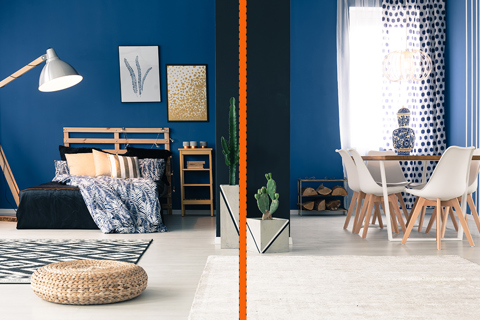Separated but living under the same roof

If you’re separated but still living with your spouse, this is called ‘separation under one roof’. Many separated couples do this for a variety of reasons. It’s not ordinarily an issue until both parties seek divorce and need to prove to the court that they are in fact separated.
As we spent more time together during the pandemic and when economic times have been tough, some couples realised “enough is enough”.
Unfortunately, the nature of challenging economic times, partners losing work, and general uncertainty as to our financial futures, creating two residences (and incurring the significant cost of this) can be financially impossible.
You can separate but remain living under the same roof?
This does not mean that you cannot separate from your partner and remain living under one roof. Importantly, provided it is safe to do so.
You can be separated under one roof for a period of time – this could be a week or two or a number of months.
Why do couples choose to live under the same roof once separated?
The most common reason is financial.
Parties who separate often cannot afford to continue paying the mortgage, and/or rent for two residences plus two sets of household living expenses so will remain living under one roof to conserve their financial situation.
Another reason is for children. Many families do not want their children to be moving between two different households.
Important actions when you decide to separate but remain living under the one roof
It is important that you keep a record of your date of separation.
The reason for this is that it dictates the deadlines for filing documents in the Family court.
For married couples, you can only file for a divorce 12 months after your date of separation (which then starts the limitation period for commencing proceedings for financial matters).
For de facto couples, the date of separation dictates the timeline for when property proceedings generally must commence (without seeking leave of the court).
There is often disagreement between parties as to when the exact date of separation was, and in the event of a dispute between parties as to pin-pointing this date, the court will determine this issue as a question of fact.
It is therefore recommended that separating de facto parties attempt to reach a settlement for financial matters as soon as possible, even if living under the one roof.
Factors the court may consider to determine the date you separated
The court considers a number of factors when determining when parties separated, when they are living under one roof.
There is no closed group of factors that must be addressed in an affidavit (statement of truth) to the court when establishing separation and living under the one roof. Some of the factors they will consider include the following.
- The date the parties assert separation occurred;
- Evidence how the parties communicated their intention to separate to the other party - i.e. verbally or by some form of written communication;
- The reasons why the parties continued to reside under the same roof despite separation - i.e. care of children or financial reasons;
- What arrangements are in place for children under the age of 18;
- Evidence of separation of financial interests - i.e. opening of separate bank accounts or change to beneficiaries for superannuation or life insurance;
- Notification of the separation has been communicated to an external agency- i.e. Centrelink or the Child Support Agency;
- Evidence that confirms sleeping arrangements between the parties has changed such that they are sleeping in different bedrooms or areas of the house;
- Cessation of sexual relations between the parties. This is not an essential factor but is a factor that is considered;
- Evidence that demonstrates the parties have communicated their separation to family and friends. This will also include confirmation the parties no longer celebrate special occasions such as birthdays or Christmas together; and
- Whether one of the parties or both have commenced another relationship.
What documentation will the court require to prove separation?
For parties separated and living under the same roof, additional evidence will also be required, such as an affidavit from a third party (i.e. a friend or family member).
The third party’s affidavit will provide evidence that confirms they were aware of the separation of the parties, and for example, they had witnessed the parties each had separate bedrooms in the same house or were told by either party.
Get help from a family lawyer
Separation is a difficult time, emotionally, mentally and financially, at any time.
Whilst the safety of any party and their children is always the primary concern of our team at Meillon & Bright if you:
- need assistance for a separation plan;
- are not concerned for your safety; and
- are considering remaining under the one roof;
please talk to our team. We can give you some practical tips as well as legal advice as to how to assist during this difficult time. For any partner considering separation, we often find the earlier you seek advice, the greater the outcome is for you moving forward.
Contacting Meillon & Bright
Family Lawyers Perth & Sydney
The information contained in this article is of general nature and should not be construed as legal advice. If you require further information, advice or assistance for your specific circumstances, please contact Meillon & Bright Family Lawyers.


